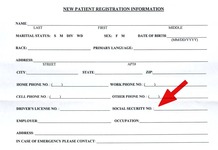 |
| Angelika/Mike Schilli |
|
Michael In the United States, U.S. citizens and legal immigrants alike identify themselves by a nine-digit number that looks like XXX-XX-XXXX. Germany has similar sounding numbers called "Sozialversicherungsnummern", which translate roughly to "Social Security Number", but they're different in that they only identify employed individuals and allow officials to track people's eligibilty for payments from the German retirement system. In the U.S., on the other hand, the SSN is used for general identification of individuals. Illegal immigrants don't have valid SSNs, but they often buy stolen numbers or recycle numbers of deceased citizens, because without an SSN, it's impossible to open a bank account or get a driver's license for the state the individual currently is residing in. Even doctor's offices hand out forms that ask for the SSN to link the patient to their health insurance if they have any. If you call your bank's phone operators, they identify the caller by the last four digits of their SSN, which the bank has on file. When I came to the U.S. in 1996, I remember that even the supermarket chain Costco wanted my SSN on their membership form, and I gave it to them, because I was an idiot who didn't know any better back then.
American citizens get their SSN at birth from the government. For legal immigrants, getting their SSN is the first step to gain ground in their new environment (Rundbrief 01/1997). But it's important to know that there's a lot of fraud happening with SSNs as well. It's very common that they get stolen, for example. If you carry your SSN in your wallet and a pickpocket snatches it, the culprit often sells off the SSN to dubious individuals who then soon after take on the identity of the victim ("identity theft"). They apply for loans which they never intend to pay back, or perform all kinds of malicious mischief which often takes the victim years to repair afterwards, because their reputation is ruined and their credit report Rundbrief 05/2004) received a severe dent.
If you're at a hospital or at a lab and someone is taking a blood sample, the employees no longer use the SSN, but identify the patients by their date of birth. The nurse asks "what's your date of birth?" and then compares your answer with what's on the form that describes your case and identity. That way, it's rather unlikely that Mrs Smith is going to get Mr Jones' medicine injected. If you call your credit card company and want to know your balance, the automated system often wants to know your mother's maiden name, because that's usually also a field the form asks for when you apply for a new account.
In critical situations, like when you report your credit card stolen, the credit card companies often identify customers by their credit history. They'll ask questions like: Who was your employer when you applied for your first credit card? If you've switched jobs many times over the course of several years, you often need to think hard to come up with the correct answer.
For security reasons, more and more people have become very careful about handing out their SSN to the plethora of services that are asking for it. Does the supermarket need it? Of course not. And when I'm at a doctor's office nowadays and the new patient form asks for my SSN, I'll leave it blank (Figure 2) and wait what the receptionist is going to say. Why on earth would any sensible person leave their SSN with a receptionist who could easily sell the number online and make my life a living hell? Most doctor's offices will be okay with that and won't even ask for your SSN anymore if you hand them your insurance card. Instead of the SSN, they use the number printed on the insurance card, which uniquely identifies the insured patient, which is what they need. They have no business identifying a U.S. resident with their credit history. That's good progress.
If you sign up for an online service like Yahoo or Facebook, in the U.S., the account is typically secured by a password. In case the customer forgets the password, there's so-called "security questions" that the customer answered at sign-up, questions that only a particular customer is supposed to know the answer to. Typical questions are "What was the name of your first pet?" or "What street did you live on when growing up?", but since online predators can find out the answers to these questions often by simply scouring people's Facebook profiles, I think this approach amounts to nothing but dangerous security theater.
In figure 1, you can see a credit card application form, which not only asks for the applicant's annual salary, but also for the SSN. Can you imagine that the department store chain Macy's grants new customers a 15% discount on their purchase if they fill out this form? The people behind the register ask me every time I purchase something at Macy's if I would like to fill out the form, but I'm thinking every time: How stupid would I have to be to put my SSN on a piece of paper that is lying around for several hours at a register, with dozens of people glancing at it, containing a number that makes it very easy for thieves to steal my identity? I recommend: If in doubt, be stingy.
Greetings from our information hungry country:
Angelika & Michael












